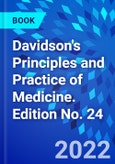Key features:
- Part 1 'Fundamentals of Medicine' - provides an account of the principles of genetics, immunology, infectious diseases, population health, oncology and pain management, along with a discussion of the core principles behind clinical decision-making and good prescribing.
- Part 2 'Emergency and Critical Care Medicine' - covers medical emergencies in poisoning, envenomation and medicine in austere environments, as well as common presentations in acute medicine and the recognition and management of the critically ill.
- Part 3 'Clinical Medicine'- covers the major medical specialties, each thoroughly revised and brought fully up to date. A new section on COVID-19 has been added and the impact of this infection is described throughout the book.
- Clinical Examination overviews - extended and updated to summarise the main elements for each system.
- Presenting Problems sections - provide a clear pathway for the assessment of and approach to the most common complaints in each specialty.
- Practice Point summaries - detail the practical skills that medical students and junior doctors must acquire.
- Emergency boxes - emphasise the core knowledge needed to manage acutely ill patients.
- In Old Age, In Pregnancy and In Adolescence boxes - highlight differences in the practice of medicine in these patient groups, and illustrate the interfaces between medical, obstetric and paediatric services.
- The text is extensively illustrated - with over 1000 diagrams, clinical photographs, and radiology and pathology images.
- The global perspective is enhanced by an International Advisory Board of experts from 11 countries and by leading authors from around the world.
The complete, downloadable eBook version is included with your (print copy) purchase - for easy access on your portable device, anytime, anywhere! Now enhanced with:?
- NEW interactive self-assessment material - over 150 Questions and Answers test your understanding of chapter key points and aid efficient exam preparation
Davidson's will serve readers everywhere as a core text that integrates medical science with clinical medicine, conveying key knowledge and practical advice in a highly accessible and readable format.
REVIEWS
Beautifully constructed with superb clarity of style - Davidson's continues to provide for students, doctors and other health professionals a sound basis for the practice of medicine.
Royal Society of Medicine and Society of Authors Medical Book Awards
This book comes through where others fail: an excellent textbook, easy to read and superb value.
British Medical Journal
Table of Contents
Part 1: Fundamentals of medicine1. Clinical decision-making
2. Clinical therapeutics and good prescribing
3. Clinical genetics
4. Clinical immunology
5. Population health and epidemiology
6. Principles of infectious disease
Part 2: Emergency and critical care medicine
7. Poisoning
8. Envenomation
9. Environmental medicine
Part 3: Clinical Medicine
10. Acute medicine and critical illness
11. Infectious disease
12. HIV infection and AIDS
13. Sexually transmitted infections
14. Clinical biochemistry and metabolic medicine
15. Nephrology and urology
16. Cardiology
17. Respiratory medicine
18. Endocrinology
19. Nutritional factors in disease
20. Diabetes mellitus
21. Gastroenterology
22. Hepatology
23. Haematology and transfusion medicine
24. Rheumatology and bone disease
25. Neurology
26. Stroke medicine
27. Medical ophthalmology
28. Medical psychiatry
29. Dermatology
30. Maternal medicine
31. Adolescent and transition medicine
32. Ageing and disease
33. Oncology
34. Pain and palliative care
35. Laboratory reference ranges








